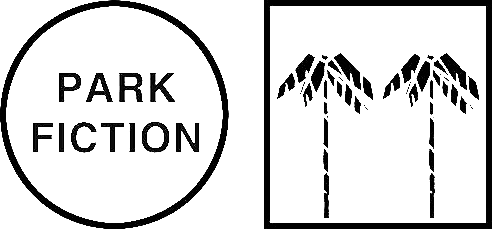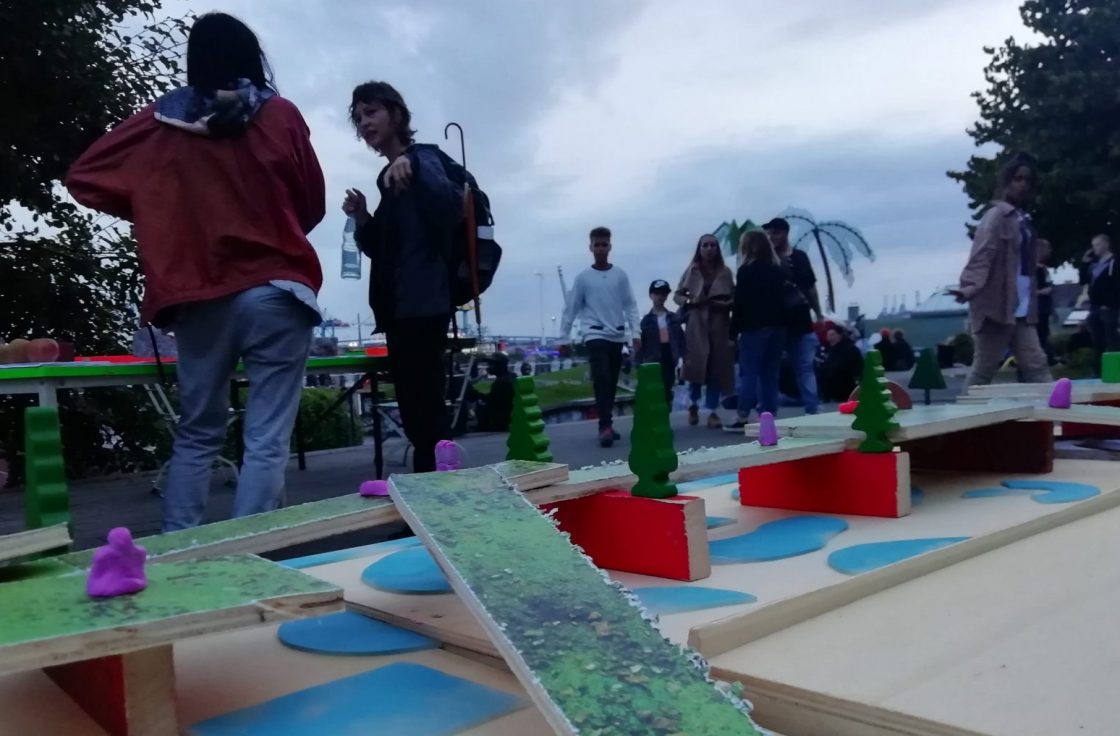Hamburg, April 2022 – The dispute about Park Fiction is not a village farce. It questions the self-organisation in St. Pauli and the methods that have been developed over the years. We have written and discssed this paper in the context of St. Pauli selber Machen (SPSM).
Since the late 1980s, St. Pauli has stood for a resistant neighbourliness with great inventiveness, from which essential innovations and impulses emanated. As is seldom the case, it has succeeded in interweaving left-wing politics with the everyday fabric of informally operating pubs, the music and art scene, friendship circles and the fan base of FC St. Pauli.
Now a „residents‘ initiative: Noise in the Park“ has severed this connection. Whether unconsciously or out of carelessness, a template has been created for regulatory policy and security discourse: The current attacks on Park Fiction are attacks on self-organisation in St. Pauli and Hamburg. Why?
Park Fiction would not be conceivable without the fierce struggles around Hafenstrasse, and is at the same time a departure from a certain form of harshness that these struggles stood for. From the demand „The houses to those who live in them“ we arrived at the question „Who shapes the city and the public space“.
This transformation towards a search for new forms that allow connection and participation for many and diverse people had been exemplified shortly before by the Zapatista movement in Mexico: Instead of confronting state authorities, the Zapatistas entered into conversation with civil society and generated parallel counter-power.
Inspired by this, in a situation that is of course not comparable, Park Fiction has also initiated a parallel planning process without asking the authorities for permission beforehand. The parallel planning process and collective wish production are the central conceptual components of Park Fiction.
„We stopped preaching and started listening“ – this important principle was a rupture with the missionary gesture of the anti-imperialist rebels in Mexico, for Park Fiction a rupture with the authority of planning bodies, architects, artists, pastors, social educators, authorities, politics.
Park Fiction is a model for independently self-organised dialogical processes. Inviting artistic tools turned the planning process into a playful platform for exchange. This is more complex than pure yes/no decisions, requires curiosity instead of instruction, collective enquiry instead of ready-made plan, ideas ping-pong instead of queries, process instead of data collection, making each other smarter, playing together with ideas and drafts, kneading, working through. This wish-production was carried widely over several years from 1995 onwards.
The art in the project is not the palm trees, but the process-design, the work on the ways of relating. But art has a special freedom in this society, it even has the mandate to develop its own rules, its own methods, its own perspectives, it is a free space of the informal.
That is why it is such an indispensable element when urban practices enter into confrontations with authorities. The fact that we were able to extend this artistic freedom to many heads with Park Fiction corresponds deeply with the concepts of freedom of anti-authoritarian movements and the undogmatic left.
These methods, this knowledge was shared with many people and further developed with other actors. At the Planbude, some of us refined the process design and methodology, refined the evaluation methods, worked on the question of how marginalised knowledge of many different people can come into a process and into our teams. The „St. Pauli Code“ is an example of how such a translation can succeed without fraud, and how it can become guidelines and programming for planning. This is a very responsible process.
Not only planning, but also gardening is about building relationships. We continue to work on the park with changing, voluntary intensity and in ever new constellations, visible and public to all. Internally, too, the Park Fiction Committee is not a functionalist context, but curious, interested in people, in exchange and new experiences.
The autonomy as well as the informal precariousness of our work is intentional, we do not want to become an institution.
So how does the conflict get into the story?
The suffering of certain residents due to night-time noise is well known.
Park Fiction reacted with „Stretching your feet into the Elbe“, the planning of the riverbank strip as a relief and extension of Park Fiction.
This process wish-production was rejected by part of the „Noise in the Park-Initiative“ in an open letter.
An already scheduled joint clarifying discussion in a pleasant atmosphere was cancelled for corona reasons and not resumed at a later date as had been agreed.
Instead, there was a backroom discussion between the „Initiative Lärm im Park“ and the head of the Altona district authority, several appearances and an appeal to the district parliament – without making this public in any way.
Annex 1 Appeal by the „Noise in the Park Initiative“ 1
A „Kleine Anfrage“ by the CDU to the Senate with destructive content and the disastrous articles in the MOPO in the same tenor, were the consequences.
Enclosure 2 CDU small enquiry
Annex 3 MOPO article
Pandora’s box has been opened: Proposals, articles and discussions about „spaces of fear“ legitimise the designation of the area as a „dangerous place“ and, in fact, racial profiling and the destruction of neighbourly solidarity through police work. What started out of genuine concern has left the path of emancipatory neighbourhood politics, solutions are sought from institutions, even imaginations about being threatened by leftists have been repeatedly told, and all this has provided the pretext for an offensive against the methods of planning developed in the neighbourhood, and against the symbols and places of self-determination.
We welcome the fact that some of those involved have subsequently spoken critically about this – but this does not take the problems off the table:
– The result of the motion, the resolution of the district parliament, must now be implemented.
Annex 4 Resolution of the district
Annex 5 Annex to the resolution, which now has to be „worked through“ by the authority.
– Necessary updating and repair work at Park Fiction has been halted because the resolution takes precedence.
– We are currently forced to put a good face on the matter and participate in a conversation that we do not actually approve of: With the heads of the Altona and Mitte districts, representatives of the authorities and the „Noise in the Park“ initiative. Another meeting in this politically rather problematic format is scheduled for the beginning of May.
– A group that has been working informally – but reliably – with artistic methods on democracy for years is being forced in this way, a (bureaucratic) way of working, formal cooperation and alliance politics from a NIMBY perspective.
How do we get out of this situatio
1The listed documents will be available at the meeting on Monday, April 25

